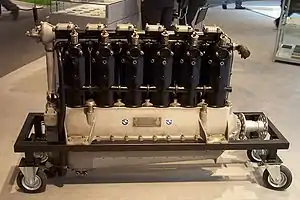BMW IV
The BMW IV was a six-cylinder, water-cooled inline aircraft engine built in Germany in the 1920s. Power was in the 180 kW (250 hp) range.
| BMW IV | |
|---|---|
 | |
| Preserved BMW IVa | |
| Type | Inline engine |
| Manufacturer | BMW |
| First run | 1919 |
| Developed into | BMW V BMW VI |
World record
On 17 June 1919 Franz Zeno Diemer flew a DFW F37, powered by a BMW IV engine to an unofficial world record height of 9,760 m (32,021 ft) from Oberwiesenfeld, reaching that altitude in 89 minutes.[1] Diemer stated at the time, "I could have gone much higher, but I didn't have enough oxygen."
Applications
Specifications
Data from BMW Type IV description and user manual.[2]
General characteristics
- Type: Six-cylinder inline piston engine
- Bore: 160 mm (6.30 in)
- Stroke: 190 mm (7.48 in)
- Displacement: 22.92 L (1,399 cu in)
- Dry weight: 290 kg (640 lb)
Performance
- Power output: Nominal 230 PS (227 hp; 169 kW) , maximum continuous 250 PS (247 hp; 184 kW)
- Compression ratio: 5.5:1
References
- "BMW group". Archived from the original on 28 February 2012. Retrieved 27 July 2013.
- bmw-grouparchiv.de Retrieved: 5 December 2016
External links
Wikimedia Commons has media related to BMW IV.
This article is issued from Wikipedia. The text is licensed under Creative Commons - Attribution - Sharealike. Additional terms may apply for the media files.